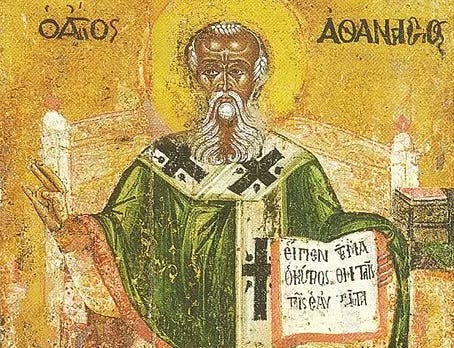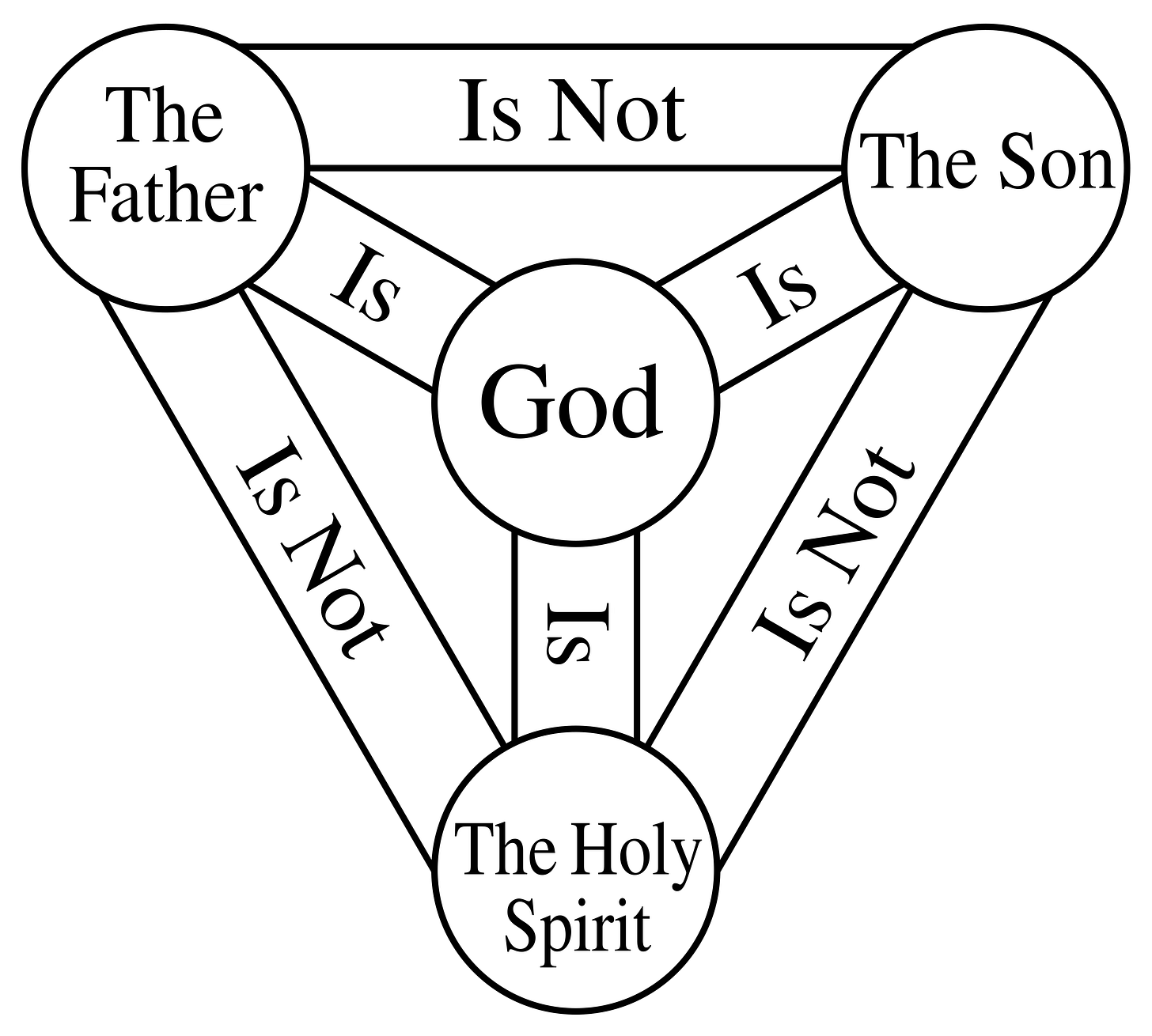Why the Athanasian Creed Still Matters (Even If Athanasius Didn’t Write It)
Reflections before Trinity Sunday
In a few days, we will celebrate Trinity Sunday, the one Sunday in the church year entirely dedicated to pondering the mystery of our Triune God: Father, Son, and Holy Spirit—one God in three Persons.
Jesus commanded his followers to go into all the world and “baptize them in the name [[singular]] of the Father, and of the Son, and of the Holy Spirit” (Matt 28:19). One name; three persons.
This mystery is what we will celebrate this Sunday, so now is the perfect time for us to talk about something many Christians have never heard of, even though it is one of the Church’s richest theological treasures: The Athanasian Creed.
So… Who Was Athanasius?
Athanasius was a bishop of Alexandria in the 4th century and one of the most important defenders of the Christian faith in the early church. When most of the world seemed ready to compromise on the identity of Jesus, Athanasius stood firm. He insisted that the Son is fully God, equal to the Father, and not a created being. The Latin phrase Athanasius contra mundum, “Athanasius against the world,” summarizes the courage it took for him to hold the doctrinal line.
But here’s the twist: Athanasius almost certainly didn’t write the Athanasian Creed.
Wait, He Didn’t Write It?
Nope. The creed likely originated several centuries later, probably around the 5th or 6th century, and most likely from the Latin-speaking Western Church, possibly in Gaul (modern-day France). It’s named after Athanasius because it reflects his theology, particularly his firm conviction about the Trinity and the full divinity and humanity of Jesus.
So while he wasn’t the author, his fingerprints are all over it.
What Does the Creed Say?
The Athanasian Creed is long, detailed, and (let’s be honest), a bit intense—especially the opening and closing lines which emphasize the necessity of “holding the catholic faith” for salvation.1
But don’t let that scare you off! Here are a few highlights from the Athanasian Creed worth celebrating this Trinity Sunday:
1. “We worship one God in Trinity, and the Trinity in Unity.”
This line is the beating heart of the Athanasian Creed. God is not a committee. He is not one person pretending to be three. Nor is he three gods working together. He is one God, eternally existing as Father, Son, and Holy Spirit, distinct in person, yet perfectly united in substance and will.
.
Why it matters: We are not saved by a vague “higher power” or a distant deity. We are saved by the Triune God who is love Himself: the Father sends the Son out of love, the Son offers Himself for us in love, and the Holy Spirit dwells inside us to make the love of our Triune God known in the world. The Trinity isn’t an abstract idea; it’s the reality behind our salvation, our relationship with God, and our mission to the world.
2. “The Father is Almighty, the Son is Almighty, and the Holy Spirit is Almighty. And yet they are not three Almighties, but one Almighty.”
This kind of language might sound like a brain teaser, but it’s meant to safeguard the mystery of God’s unity. Each Person of the Trinity is fully God, not one-third of God. But there is only one God, not three.
Why it matters: These words remind us that we’re not polytheists, which was a hypothetical option for the early church that they rejected.2 At the same time, we’re not collapsing all three persons into a single mode of being. The God who created you, redeemed you, and fills you now is the same God, consistent in power, presence, and purpose.
3. “Our Lord Jesus Christ, the Son of God, is both God and man.”
About halfway through, the Athanasian Creed shifts from discussing the Trinity to discussing our Lord Jesus Christ. This second half of the creed is often overlooked but equally vital. It walks through the mystery of the Incarnation: that Jesus is “perfect God and perfect man,” with a rational soul and human flesh. He is “equal to the Father, as touching his Godhead; and inferior to the Father, as touching his Manhood.”
Why it matters: This is where theology meets comfort. Jesus genuinely knows what it’s like to be human. He wasn’t pretending. He ate, slept, suffered, wept, and died. He then rose again in that same human body, now glorified, and ascended to the right hand of God. When he ascended, he did not leave his humanity behind. He took it with him into heaven because it is forever part of his divine identity. Can you fathom that? Our humanity has been taken into the very identity of the Triune God. To put this another way, one of the three persons of the Trinity is a human being just like you. Your body, your emotions, your struggles, and your pain—they matter to him. He has been there, and he’s interceding for you.
So Why Should We Care About an Ancient Creed
Because it tells the truth beautifully, rigorously, and unapologetically about the Triune God that we worship and trust. The Athanasian Creed draws boundary lines so that we don’t lose sight of who God is and who Jesus is, and it reminds us that Christian faith isn’t about figuring out God but about receiving what He has revealed and learning to know Him and trust Him more deeply.
On Trinity Sunday, we won’t try to solve a puzzle. We will step into a mystery. We will worship the Father, through the Son, in the Holy Spirit—one God, forever blessed and eternally good.
And if a 1,500-year-old creed helps us say that a little better, we’re all the richer for it.
The opening words of the Athanasian Creed are, “Whosoever will be saved, before all things it is necessary that he hold the Catholic Faith.” The closing words are, “This is the Catholic Faith, which except a man believe faithfully, he cannot be saved.”
Paul’s reworking of the Shema (Deut 6:4) in 1 Cor 8:6 had a large part to play in this rejection.



